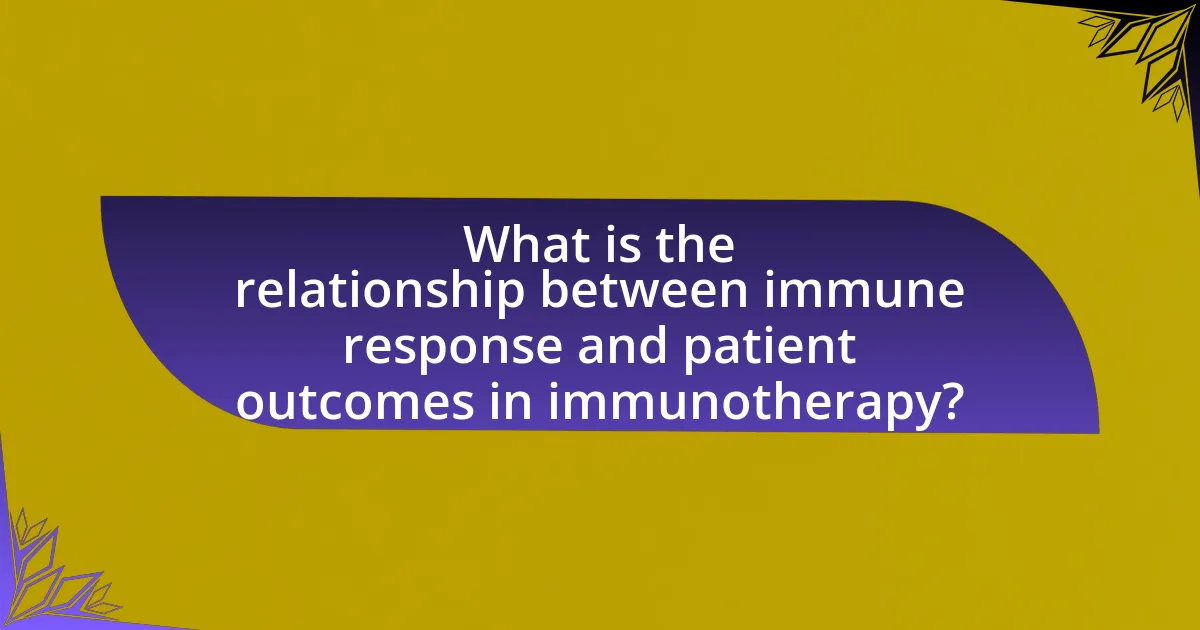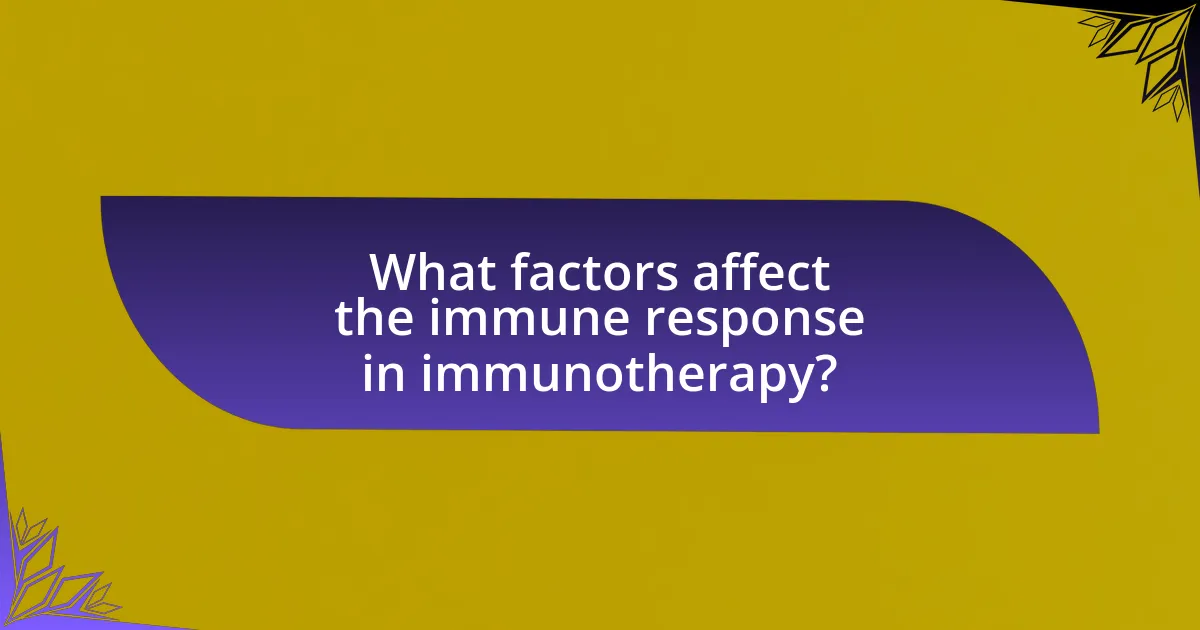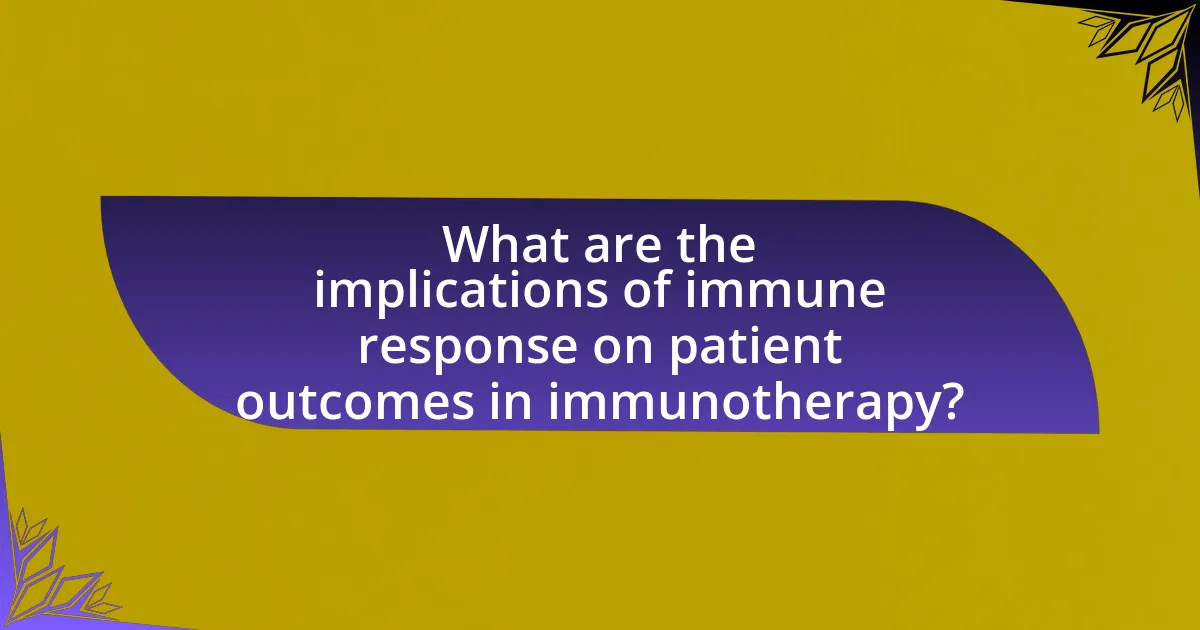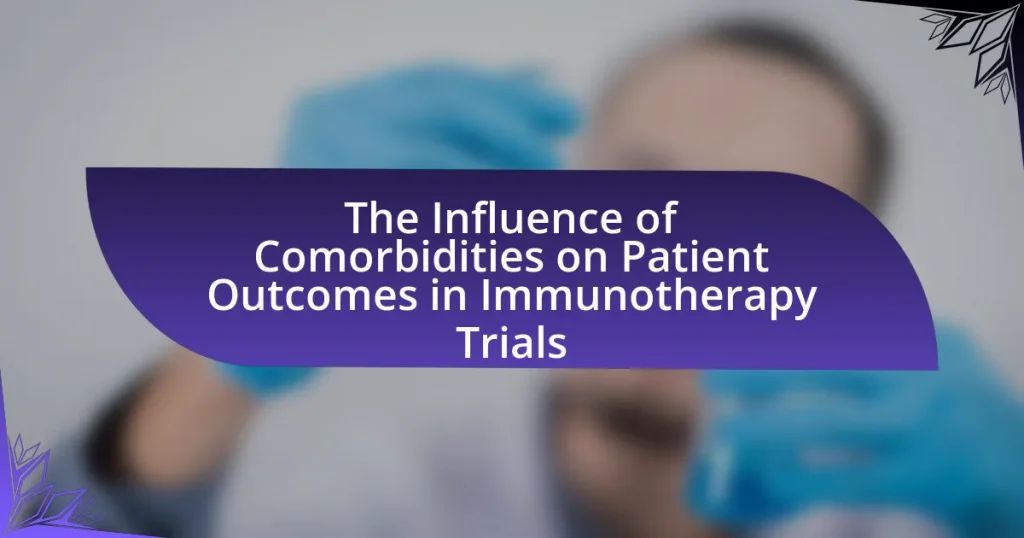The article examines the critical relationship between immune response and patient outcomes in immunotherapy, highlighting how a robust immune response correlates with improved clinical efficacy. It discusses key immune markers, such as PD-L1 and tumor-infiltrating lymphocytes, that are associated with positive treatment responses and survival rates. Additionally, the article explores factors influencing immune response variability, including genetic factors, tumor microenvironment, and patient-specific characteristics, while emphasizing the importance of personalized immunotherapy and real-time immune monitoring in optimizing treatment strategies. Overall, the findings underscore the necessity of understanding immune responses to enhance the effectiveness of immunotherapy and improve patient prognoses.

What is the relationship between immune response and patient outcomes in immunotherapy?
The relationship between immune response and patient outcomes in immunotherapy is significant, as a robust immune response often correlates with improved clinical outcomes. Studies have shown that patients who exhibit strong immune activation, such as increased levels of tumor-infiltrating lymphocytes or specific immune markers, tend to experience better responses to immunotherapy treatments. For instance, research published in the Journal of Clinical Oncology indicates that higher levels of programmed death-ligand 1 (PD-L1) expression in tumors are associated with enhanced efficacy of PD-1/PD-L1 inhibitors, leading to longer progression-free survival rates in patients. This evidence underscores the critical role of immune response in determining the effectiveness of immunotherapy and overall patient prognosis.
How does immune response influence treatment efficacy in immunotherapy?
Immune response significantly influences treatment efficacy in immunotherapy by determining how effectively the immune system can recognize and attack cancer cells. A robust immune response enhances the ability of immunotherapeutic agents, such as checkpoint inhibitors, to activate T-cells against tumors, leading to improved patient outcomes. Studies have shown that patients with higher levels of tumor-infiltrating lymphocytes often experience better responses to immunotherapy, as evidenced by a 2019 analysis published in the Journal of Clinical Oncology, which found that increased immune cell presence correlates with higher overall survival rates in melanoma patients receiving checkpoint blockade therapy. Thus, the strength and nature of the immune response are critical factors in the success of immunotherapy treatments.
What are the key immune markers associated with positive patient outcomes?
Key immune markers associated with positive patient outcomes include programmed cell death protein 1 (PD-1), programmed cell death ligand 1 (PD-L1), and tumor-infiltrating lymphocytes (TILs). PD-1 and PD-L1 expression levels are critical indicators of response to immune checkpoint inhibitors, with higher levels correlating with improved survival rates in various cancers. Additionally, the presence of TILs, particularly CD8+ T cells, has been linked to better prognosis and therapeutic response, as they indicate an active immune response against tumors. Studies have shown that patients with high TIL counts often experience longer progression-free survival and overall survival, reinforcing the importance of these immune markers in predicting positive outcomes in immunotherapy.
How do variations in immune response affect individual patient responses?
Variations in immune response significantly affect individual patient responses to immunotherapy. These variations can lead to differences in treatment efficacy, with some patients experiencing robust responses while others may show minimal or no benefit. For instance, genetic factors, such as polymorphisms in immune-related genes, can influence the activation and regulation of immune cells, thereby impacting how effectively a patient’s immune system can recognize and attack cancer cells. Studies have shown that patients with higher levels of specific immune markers, such as PD-L1 expression, often have better outcomes with checkpoint inhibitors, highlighting the role of immune response variability in treatment success.
Why is understanding immune response critical for optimizing immunotherapy?
Understanding immune response is critical for optimizing immunotherapy because it directly influences treatment efficacy and patient outcomes. The immune system’s ability to recognize and attack cancer cells is fundamental to the success of immunotherapeutic agents, such as checkpoint inhibitors and CAR T-cell therapies. Research indicates that a robust immune response correlates with improved survival rates in cancer patients receiving immunotherapy, as evidenced by studies showing that patients with higher levels of tumor-infiltrating lymphocytes often experience better responses to treatment. Additionally, understanding the mechanisms of immune evasion by tumors allows for the development of strategies to enhance immune recognition and response, thereby improving therapeutic effectiveness.
What role does the tumor microenvironment play in immune response?
The tumor microenvironment plays a critical role in shaping the immune response against tumors. It consists of various cellular components, extracellular matrix, and signaling molecules that can either promote or inhibit immune activity. For instance, the presence of immunosuppressive cells, such as regulatory T cells and myeloid-derived suppressor cells, can dampen the effectiveness of anti-tumor immune responses. Additionally, factors like hypoxia and the secretion of immunosuppressive cytokines can further create an environment that hinders immune cell activation and function. Studies have shown that a more inflamed tumor microenvironment, characterized by the presence of cytotoxic T lymphocytes and pro-inflammatory cytokines, is associated with better patient outcomes in immunotherapy, highlighting the importance of the tumor microenvironment in determining the efficacy of immune-based treatments.
How can immune profiling enhance patient selection for immunotherapy?
Immune profiling enhances patient selection for immunotherapy by identifying specific biomarkers that predict treatment response. This profiling allows clinicians to assess the immune landscape of tumors, including the presence of immune cells, cytokines, and other factors that influence the effectiveness of immunotherapy. For instance, studies have shown that patients with high levels of tumor-infiltrating lymphocytes often experience better outcomes with checkpoint inhibitors. By utilizing immune profiling, healthcare providers can tailor immunotherapy approaches to individual patients, thereby increasing the likelihood of successful treatment and minimizing unnecessary side effects.

What factors affect the immune response in immunotherapy?
The immune response in immunotherapy is affected by several key factors, including the patient’s genetic makeup, tumor microenvironment, and the type of immunotherapy used. Genetic variations can influence how an individual’s immune system recognizes and responds to cancer cells, impacting treatment efficacy. The tumor microenvironment, which includes the presence of immune suppressive cells and signaling molecules, can inhibit immune activation and response. Additionally, the specific immunotherapy approach, such as checkpoint inhibitors or CAR T-cell therapy, determines the mechanisms of action and potential effectiveness, as evidenced by clinical trials showing varying response rates based on these factors.
How do patient-specific factors influence immune response?
Patient-specific factors significantly influence immune response by affecting the efficacy and safety of immunotherapy treatments. These factors include genetic variations, age, sex, comorbidities, and the microbiome, all of which can alter immune system functionality. For instance, genetic polymorphisms in immune-related genes can lead to differences in cytokine production and T-cell activation, impacting how effectively a patient responds to immunotherapy. Additionally, age-related changes in immune function, such as decreased T-cell diversity, can result in a diminished response to treatment. Studies have shown that patients with specific genetic markers, such as those related to PD-1 or CTLA-4 pathways, may experience varying levels of therapeutic benefit from checkpoint inhibitors. Therefore, understanding these patient-specific factors is crucial for optimizing immunotherapy outcomes.
What genetic factors are linked to variations in immune response?
Genetic factors linked to variations in immune response include polymorphisms in genes such as HLA (human leukocyte antigen) genes, cytokine genes, and genes involved in immune signaling pathways. For instance, specific HLA alleles can influence the presentation of antigens to T cells, thereby affecting the strength and type of immune response. Additionally, variations in cytokine genes, such as IL-10 and TNF-alpha, can modulate inflammatory responses and overall immune function. Research has shown that these genetic variations can significantly impact patient outcomes in immunotherapy, as they may determine the efficacy of treatments like checkpoint inhibitors and CAR-T cell therapy. Studies, such as those published in “Nature Reviews Immunology,” highlight the role of these genetic factors in shaping individual responses to immunotherapy.
How do comorbidities impact the effectiveness of immunotherapy?
Comorbidities significantly reduce the effectiveness of immunotherapy by altering the immune response and increasing treatment-related toxicity. Patients with conditions such as diabetes, cardiovascular disease, or autoimmune disorders often experience a compromised immune system, which can hinder the desired therapeutic effects of immunotherapy. For instance, a study published in the Journal of Clinical Oncology found that patients with multiple comorbidities had a lower overall response rate to immune checkpoint inhibitors compared to those without such conditions. This evidence underscores the importance of considering comorbidities when evaluating treatment plans for immunotherapy, as they can directly influence patient outcomes and the overall efficacy of the treatment.
What role do treatment regimens play in shaping immune response?
Treatment regimens significantly influence the immune response by determining the type, timing, and dosage of therapeutic agents administered. These regimens can enhance or suppress immune activity, thereby affecting the overall efficacy of immunotherapy. For instance, combination therapies that include checkpoint inhibitors and targeted agents have been shown to synergistically activate T cells, leading to improved tumor control and patient outcomes. Research published in the Journal of Clinical Oncology by Wolchok et al. (2017) demonstrated that specific treatment schedules can optimize immune activation, resulting in durable responses in melanoma patients. Thus, the design of treatment regimens is crucial for shaping the immune response and ultimately impacting patient outcomes in immunotherapy.
How do combination therapies enhance immune activation?
Combination therapies enhance immune activation by simultaneously targeting multiple pathways involved in the immune response, leading to a more robust and effective activation of immune cells. For instance, combining immune checkpoint inhibitors with other modalities, such as targeted therapies or vaccines, can increase the expression of co-stimulatory molecules and cytokines, which are crucial for T-cell activation and proliferation. Research has shown that such combinations can lead to improved tumor infiltration by immune cells and enhanced anti-tumor responses, as evidenced by clinical trials demonstrating higher response rates and improved survival outcomes in patients receiving combination therapies compared to monotherapy.
What is the impact of treatment timing on immune response?
Treatment timing significantly influences the immune response in immunotherapy. Administering treatment at optimal times can enhance the effectiveness of immune activation, leading to improved patient outcomes. For instance, studies have shown that early intervention during the tumor’s immune evasion phase can result in a more robust immune response, as evidenced by increased T-cell activation and proliferation. Conversely, delayed treatment may allow tumors to adapt and resist immune attacks, diminishing the overall efficacy of the therapy. Research published in the Journal of Clinical Oncology indicates that timing adjustments in checkpoint inhibitor therapies can lead to better survival rates, highlighting the critical role of treatment timing in shaping immune responses.

What are the implications of immune response on patient outcomes in immunotherapy?
The immune response significantly influences patient outcomes in immunotherapy, as a robust immune activation often correlates with improved therapeutic efficacy. Studies have shown that patients exhibiting strong immune responses, characterized by increased levels of immune cell infiltration and cytokine production, tend to experience better clinical responses and longer survival rates. For instance, research published in the Journal of Clinical Oncology indicates that higher tumor-infiltrating lymphocyte levels are associated with enhanced responses to checkpoint inhibitors, leading to improved overall survival in melanoma patients. Thus, the strength and quality of the immune response are critical determinants of the success of immunotherapy treatments.
How can monitoring immune response improve clinical outcomes?
Monitoring immune response can significantly improve clinical outcomes by enabling personalized treatment strategies in immunotherapy. By assessing the immune system’s activity, clinicians can identify which patients are responding positively to treatment and which are not, allowing for timely adjustments to therapy. For instance, studies have shown that measuring biomarkers such as PD-L1 expression or tumor-infiltrating lymphocytes can predict patient responses to checkpoint inhibitors, leading to better-targeted therapies and improved survival rates. Additionally, real-time monitoring can help detect adverse immune-related events early, facilitating prompt management and reducing complications, ultimately enhancing overall patient outcomes.
What are the best practices for assessing immune response during treatment?
The best practices for assessing immune response during treatment include the use of biomarkers, imaging techniques, and clinical evaluations. Biomarkers such as cytokines, immune cell populations, and tumor mutational burden provide quantitative measures of immune activity and can indicate treatment efficacy. Imaging techniques, including PET scans and MRI, help visualize changes in tumor size and metabolic activity, reflecting immune response. Clinical evaluations, such as patient-reported outcomes and physical examinations, are essential for assessing overall health and treatment effects. These methods are supported by studies showing that integrating multiple assessment strategies leads to a more comprehensive understanding of immune responses and correlates with improved patient outcomes in immunotherapy.
How can real-time immune monitoring guide treatment adjustments?
Real-time immune monitoring can guide treatment adjustments by providing immediate insights into a patient’s immune response, allowing clinicians to tailor therapies based on the dynamic changes observed. For instance, monitoring biomarkers such as cytokine levels or T-cell activity can indicate how well a patient is responding to immunotherapy. Studies have shown that patients with elevated levels of specific immune markers often experience better outcomes, enabling healthcare providers to intensify or modify treatment regimens accordingly. This approach enhances personalized medicine, as evidenced by research indicating that adaptive treatment strategies based on immune monitoring can lead to improved survival rates in cancer patients undergoing immunotherapy.
What challenges exist in correlating immune response with patient outcomes?
Correlating immune response with patient outcomes presents several challenges, primarily due to the complexity and variability of immune responses among individuals. Individual differences in genetics, pre-existing health conditions, and the tumor microenvironment can significantly influence how a patient’s immune system reacts to immunotherapy. For instance, studies have shown that biomarkers such as PD-L1 expression and tumor mutational burden can predict responses, but their reliability varies across different cancer types and patient populations. Additionally, the timing of immune response measurement can complicate correlations, as immune effects may take time to manifest, leading to potential misinterpretations of treatment efficacy. These factors collectively hinder the establishment of a clear, consistent relationship between immune response metrics and clinical outcomes in immunotherapy.
What are the limitations of current biomarkers in predicting outcomes?
Current biomarkers have significant limitations in predicting outcomes, primarily due to their lack of specificity and sensitivity. Many biomarkers do not accurately reflect the complex immune responses involved in immunotherapy, leading to inconsistent results across different patient populations. For instance, the PD-L1 expression level, often used as a biomarker for checkpoint inhibitors, has shown variable predictive value, with studies indicating that only a subset of patients with high PD-L1 expression respond to treatment. Additionally, biomarkers may not account for tumor heterogeneity, which can result in misleading interpretations of a patient’s potential response to therapy. These limitations highlight the need for more comprehensive and reliable biomarkers that can better capture the intricacies of immune responses in diverse patient cohorts.
How can variability in immune response complicate treatment assessments?
Variability in immune response complicates treatment assessments by leading to inconsistent patient outcomes and making it difficult to predict the effectiveness of immunotherapy. Individual differences in immune system function, such as genetic factors, pre-existing conditions, and environmental influences, can result in varying levels of immune activation and response to treatment. For instance, studies have shown that patients with a robust immune response may experience better outcomes, while those with a weaker response may not benefit from the same therapies, complicating the evaluation of treatment efficacy across diverse patient populations. This variability necessitates personalized approaches to treatment and careful monitoring of immune markers to accurately assess therapeutic effectiveness.
What strategies can enhance the relationship between immune response and patient outcomes?
Strategies that can enhance the relationship between immune response and patient outcomes include personalized immunotherapy, combination therapies, and biomarker-driven approaches. Personalized immunotherapy tailors treatment based on individual patient characteristics, which has been shown to improve efficacy; for instance, studies indicate that patients with specific genetic markers respond better to certain therapies. Combination therapies, such as using checkpoint inhibitors alongside traditional treatments, have demonstrated improved survival rates in various cancers, as evidenced by clinical trials showing enhanced immune activation and tumor response. Biomarker-driven approaches, which utilize specific immune-related biomarkers to predict treatment response, allow for more effective patient stratification, leading to better outcomes; research has shown that patients with high levels of PD-L1 expression often have improved responses to PD-1 inhibitors.
How can personalized immunotherapy approaches improve patient outcomes?
Personalized immunotherapy approaches can improve patient outcomes by tailoring treatments to individual genetic and molecular profiles, enhancing the effectiveness of the immune response against specific tumors. This customization allows for more precise targeting of cancer cells while minimizing damage to healthy tissues, leading to better therapeutic efficacy and reduced side effects. Studies have shown that patients receiving personalized immunotherapy, such as CAR T-cell therapy, have experienced significantly higher remission rates compared to those undergoing standard treatments, with some reports indicating up to an 80% response rate in certain hematological malignancies.
What role does patient education play in optimizing treatment adherence?
Patient education plays a crucial role in optimizing treatment adherence by enhancing patients’ understanding of their treatment plans and the importance of following them. When patients are well-informed about their immunotherapy, including potential side effects and expected outcomes, they are more likely to adhere to prescribed regimens. Research indicates that effective patient education can lead to a 30% increase in adherence rates, as patients who understand their treatment are more motivated to follow through. This understanding fosters a sense of empowerment, enabling patients to actively participate in their care, which is essential for achieving better immune responses and improved outcomes in immunotherapy.



